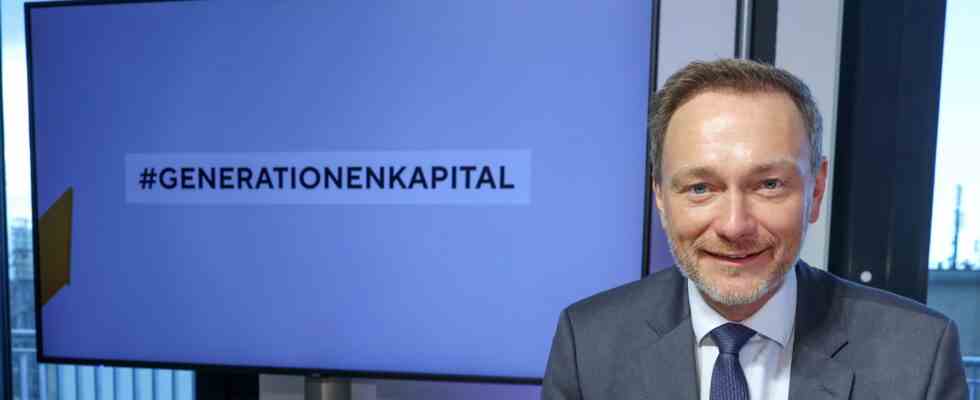As of: 01/13/2023 4:39 p.m
To stabilize pensions, the federal government wants to rely on the capital market: In future, ten billion euros a year are to flow into a fund for “generational capital” – the federal government is to bear the risk.
Federal Finance Minister Christian Lindner wants to invest a three-digit billion amount in the capital market in order to stabilize the pension system from the end of the 2030s. According to his idea, it should be ten billion euros per year over a period of 15 years, said the FDP chairman at an event on the planned “generational capital”.
There will be agreements within the traffic light government made up of SPD, Greens and FDP. His impression was that there was a common political will for this, said Lindner. In the coalition agreement, it is agreed that there will be no pension cuts and no increase in the statutory retirement age. “In order to secure this commitment in a way that is fair for the generations, we will start partially funded statutory pension insurance to stabilize the pension level and pension contribution rate in the long term.”
Lindner also emphasized that the new fund to be created should only supplement the existing pay-as-you-go statutory pension, not replace it.
Ten billion euros per year from the federal government
In the federal budget for 2023, loans of ten billion euros are now planned for the build-up of foundation assets, which are then to be used to stabilize the pension system in the long term. “This can only be the beginning,” said Lindner. It should be prescribed by law not to withdraw income from investments on the capital market too early. That shouldn’t be available until 2037 or a little later. “That’s how long we need as a run-up.” The time should be used for long-term investments in order to benefit from compound interest effects.
According to Lindner, who spoke of “generational capital”, politicians should under no circumstances decide on specific investments. This is where professionals come into play. The public foundation KenFo should – independently of the government – help with the investment of the funds. They should be invested for the long term, also in stocks. Sustainability criteria would be taken into account. The federal government bears the risk of any losses.
A three-digit billion amount is to be invested in the capital market to stabilize the pension
Nicole Kohnert, ARD Berlin, daily news at 4:00 p.m., January 13, 2023
More retirees, fewer contributors
The statutory pension system is functioning less and less due to demographic reasons. More and more retirees are accounted for by fewer contributors. That is why the federal government has to provide high subsidies from tax funds – in 2022 it was over 100 billion euros, around 30 percent of the expenditure of the statutory pension insurance.
Federal Minister of Labor Hubertus Heil (SPD) had previously spoken out in favor of long-term security for pensions in Germany on the capital market. He told the dpa news agency: “In order to make long-term provisions, we are creating generational capital in the form of a share reserve for the statutory pension insurance.”
Criticism of the share model from the Social Association Germany
Criticism came in advance from the Social Association Germany (SoVD). CEO Michaela Engelmeier told the newspapers of the Funke media group: “SoVD is convinced that there is no good pension policy on the stock market! People need security for their old-age provision.” The pay-as-you-go system of statutory pension insurance is the best option for this.
Key points share pension – generational capital
Philipp Eckstein, ARD Berlin, 13.1.2023 2:18 p.m

